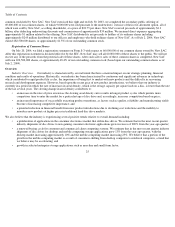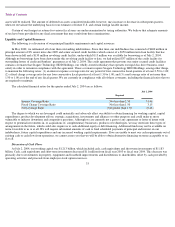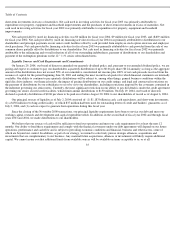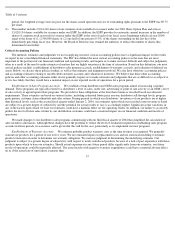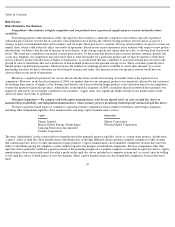Seagate 2003 Annual Report Download - page 31
Download and view the complete annual report
Please find page 31 of the 2003 Seagate annual report below. You can navigate through the pages in the report by either clicking on the pages listed below, or by using the keyword search tool below to find specific information within the annual report.
Table of Contents
Net Other Income (Expense). Net other expense decreased $15 million, or 48%, for fiscal year 2004 when compared with fiscal year
2003. The decrease in net other expense from fiscal year 2003 was primarily due to a decrease of $8 million in write-downs of our investment
in a private company, a $4 million change in the value of the underlying assets of the rabbi trust associated with the deferred compensation
plan.
Income Taxes.
We recorded a benefit from income taxes of $101 million for the fiscal year ended July 2, 2004 compared to a provision
for income taxes of $19 million for the fiscal year ended June 27, 2003. We are a foreign holding company incorporated in the Cayman Islands
with foreign and U.S. subsidiaries that operate in multiple taxing jurisdictions. As a result, our worldwide operating income is either subject to
varying rates of tax or is exempt from tax due to tax holidays or tax incentive programs we operate under in China, Malaysia, Singapore and
Thailand. These tax holidays or incentives are scheduled to expire in whole or in part at various dates through 2015. The benefit for income
taxes recorded for the fiscal year ended July 2, 2004 differs from the provision for income taxes that would be derived by applying a notional
U.S. 35% rate to income before income taxes primarily due to the net effect of (i) the tax benefit related to the aforementioned tax holidays and
tax incentive programs, (ii) an additional valuation allowance recorded for U.S. deferred tax assets, and (iii) the reversal of the $125 million tax
indemnification amount for VERITAS (further described below). Our provision for income taxes for the fiscal year ended June 27, 2003
differed from the provision for income taxes that would be derived by applying a notional U.S. 35% rate to income before income taxes
primarily due to (i) the tax benefit related to the aforementioned tax holidays and tax incentive programs and (ii) the realization of deferred tax
assets that had previously been subject to a valuation allowance. Based on our foreign ownership structure and subject to potential future
increases in our valuation allowance for U.S. deferred tax assets, we anticipate that our effective tax rate in future periods will generally be less
than the U.S. federal statutory rate. Dividend distributions received from our U.S. subsidiaries may be subject to U.S. withholding taxes when
and if distributed. Deferred tax liabilities have not been recorded on unremitted earnings of our foreign subsidiaries, as these earnings will not
be subject to tax in the Cayman Islands or to U.S. federal income taxes if remitted to our foreign parent holding company.
As of July 2, 2004, we have recorded net deferred tax assets of $58 million, the realization of which is primarily dependent on our ability
to generate sufficient U.S. taxable income in fiscal years 2005 and 2006. Although realization is not assured, management believes that it is
more likely than not that these deferred tax assets will be realized. The amount of deferred tax assets considered realizable, however, may
increase or decrease in subsequent quarters, when we reevaluate our estimates of future U.S. and certain foreign taxable income.
On July 31, 2001, Seagate Delaware and the Internal Revenue Service filed a settlement stipulation with the United States Tax Court in
complete settlement of the remaining disputed tax matters reflected in the statutory notice of deficiency dated June 12, 1998. On March 15,
2004, VERITAS received written notification from the Internal Revenue Service that the congressional Joint Committee on Taxation had
completed its review and had taken no exception to the Internal Revenue Service’s conclusions. On April 6, 2004, Seagate Delaware and the
Internal Revenue Service filed a revised settlement stipulation with the United States Tax Court in connection with the statutory notice of
deficiency, which reflected the parties’ agreement to fully resolve the remaining tax matters included in the statutory notice of deficiency. On
June 28, 2004, the revised settlement stipulation was made final by the United States Tax Court and the case has been closed.
In the fiscal year ended July 2, 2004, we recorded a $125 million income tax benefit from the reversal of $125 million of accrued income
taxes relating to tax indemnification amounts due to VERITAS pursuant to the Indemnification Agreement between Seagate Delaware, Suez
Acquisition Company and VERITAS. The tax indemnification amount was recorded by us in connection with the purchase of the operating
assets of Seagate Delaware and represented U.S. tax liabilities previously accrued by Seagate Delaware for periods prior to the acquisition date
of the operating assets. As a result of the conclusion of the tax audits with no additional tax liabilities due, we determined that the $125 million
accrual for the tax indemnification was no longer required and it was reversed in our third fiscal quarter of 2004.
30







